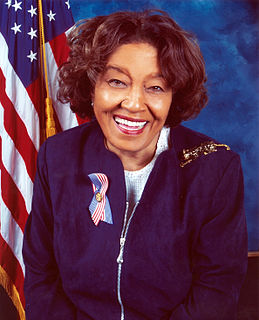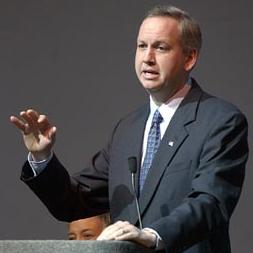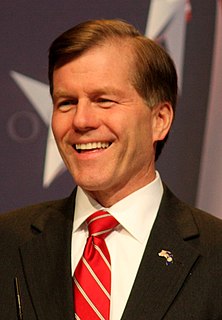
Frank Lewis O'Bannon was an American politician who served as the 47th Governor of Indiana from 1997 until his death in 2003.

Julia May Carson, born Julia May Porter, was a member of the United States House of Representatives for Indiana's 7th congressional district from 1997 until her death in 2007. Carson was the first woman and first African American to represent the 7th District. She was also the second African American woman elected to Congress from Indiana, after Katie Hall.

Barton "Bart" R. Peterson is an American lawyer and politician who served as mayor of the U.S city of Indianapolis, Indiana. He is a past president of the National League of Cities. A Democrat first elected in 1999, he was defeated in 2007 in a bid for a third term in what was widely viewed as a huge upset.
The Democratic Party of Indiana is the affiliate of the U.S. Democratic Party in the U.S. state of Indiana.

The Indiana gubernatorial election of 2008 was held on November 4, 2008. Incumbent Republican nominee Mitch Daniels was challenged by Democratic nominee Jill Long Thompson and Libertarian nominee Andy Horning. Daniels easily won reelection, defeating Long Thompson by over 17 points.

W. Wayne Townsend was an American politician from the U.S. state of Indiana. A Democrat, he was his party's gubernatorial nominee in 1984. Townsend was defeated by the incumbent Republican Governor Robert D. Orr in a year in which Indiana joined forty-eight other states in reelecting the Reagan-Bush ticket.

Indiana's 7th congressional district special election of 2008 took place March 11, 2008 to fill the seat in the United States House of Representatives left vacant by the death of 7th district representative Julia Carson (D) on December 15, 2007. The election determined who would fill the vacancy for the rest of the 110th United States Congress. Indiana Gov. Mitch Daniels set the date for the special election. Both political parties had previously agreed to this date. Democrat André Carson won the election with an 18.17% voter turnout.

The 2004 Indiana gubernatorial election took place on November 2, 2004, to elect the Governor of Indiana.

The 2000 Indiana gubernatorial election was held on November 7, 2000. Incumbent Governor Frank O'Bannon, a Democrat, was re-elected over Republican David M. McIntosh with 57% of the vote. Libertarian Andrew Horning also ran and received 2% of the vote. O'Bannon's victory was the fourth consecutive election in which a Democrat was elected Governor of Indiana, the longest winning streak for that party in the state since the Civil War. As of 2019, this is the most recent election in which a Democrat was elected Governor of Indiana.

United States gubernatorial elections were held in 12 states and two territories. Of the eight Democratic and four Republican seats contested, only that of North Carolina changed party hands, giving the Republicans a net gain of one governorship. These elections coincided with the presidential election on November 6, 2012.

John Richard Gregg is an American businessman, attorney, author, and politician from Indiana. He was a state representative in the Indiana House of Representatives from 1986 to 2003, serving as Majority Leader from 1990 to 1994, Minority Leader for a term, and as the 85th and longest-serving Democratic Speaker of the Indiana House from 1996 to 2003.

The 2012 Indiana gubernatorial election took place on November 6, 2012. Incumbent governor Mitch Daniels was term-limited and unable to seek a third term. The Republican candidate, Congressman Mike Pence; the Democratic candidate, former Speaker of the Indiana House of Representatives John R. Gregg; and the Libertarian candidate, youth mentor, small business owner and reality TV personality, Rupert Boneham, were all unopposed in their respective primaries or conventions and contested the general election.

Joseph Hadden Hogsett is an American attorney, prosecutor, and politician who is the 49th mayor of Indianapolis. Hogsett served as the Secretary of State of Indiana from 1989 to 1994 and as the Chairman of the Indiana Democratic Party from 2003 to 2004. He was the Democratic nominee for the U.S. Senate in 1992, for Indiana's 2nd congressional district in 1994 and for Attorney General of Indiana in 2004. He most recently served as the United States Attorney for the Southern District of Indiana from 2010 to 2014. On November 3, 2015, he won the race for Mayor of Indianapolis in the 2015 election.

United States gubernatorial elections were held on November 8, 2016 in 12 states and two territories. The last regular gubernatorial elections for nine of the 12 states took place in 2012. The last gubernatorial elections for New Hampshire, Oregon, and Vermont took place in 2014, as Oregon held a special election due to the resignation of governor John Kitzhaber, while the governors of New Hampshire and Vermont both serve two-year terms. The 2016 gubernatorial elections took place concurrently with several other federal, state, and local elections, including the presidential election, Senate, and House elections.

The 2016 United States Senate election in Indiana was held on November 8, 2016, to elect a member of the United States Senate to represent the State of Indiana, concurrently with the 2016 U.S. presidential election, as well as other elections to the United States Senate in other states and elections to the United States House of Representatives and various state and local elections.

The 1992 Indiana gubernatorial Election was held on November 3, 1992. Incumbent Governor Evan Bayh, a Democrat, won reelection over his Republican challenger, Linley E. Pearson with 62% of the vote. He was the first Democratic governor of Indiana to win reelection since governors became eligible for election to consecutive terms in office in 1972.

The 1988 Indiana gubernatorial Election was held on November 8, 1988 in all 92 counties in the state of Indiana. Incumbent Governor Robert D. Orr, a Republican, was ineligible to run for a third consecutive term due to term limits set forth in the Indiana Constitution. In the general election, the Republican nominee, Lieutenant Governor John Mutz, was defeated by Democrat Indiana Secretary of State Evan Bayh by a margin of six percentage points. Bayh was the first Democrat to be elected Governor of Indiana since Roger D. Branigin's victory during the 1964 Democratic landslides twenty-four years previously.

The 2016 Indiana gubernatorial election was held on November 8, 2016, to elect the Governor and Lieutenant Governor of Indiana, concurrently with the 2016 U.S. presidential election as well as elections to the United States Senate and elections to the United States House of Representatives and various state and local elections. The primaries were held on May 3, 2016. Republican Lieutenant Governor Eric Holcomb won the race with 51.4% of the vote.






















